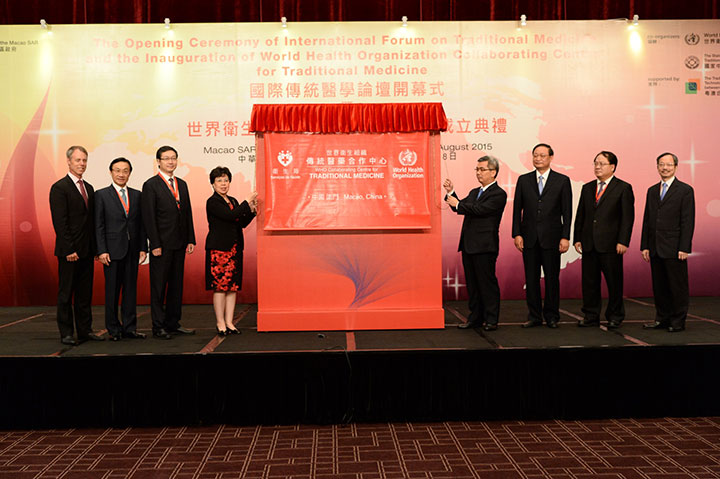WHO Collaboration Centre for Traditional Medicine Inaugurated in Macau

Wong Sio Chak and Margaret Chan Fung Fu-chun plus other guests attend the World Health Organization Collaboration Centre inauguration ceremony (Photo provided by Health Bureau)
The World Health Organization (WHO) has approved the setting up of the World Health Organization Collaboration Centre for Traditional Medicine by Macau's Health Bureau. The Centre is under the Health Bureau, with the Deputy Director of the National Health and Family Planning Commission and director of the State Administration of Traditional Chinese Medicine Wang Guoqiang serving as honorary adviser.
The inauguration ceremony of the World Health Organization Collaboration Centre was presided over by MSAR Acting Chief Executive Wong Sio Chak, World Health Organization Director-General Margaret Chan Fung Fu-chun, the Deputy Director of the National Health and Family Planning Commission and the Director of State Administration of Traditional Chinese Medicine Wang Guoqiang, Deputy Director of the Liaison Office of the Central People's Government in the MSAR Sun Da, Deputy Commissioner of the Office of the Commissioner of the Ministry of Foreign Affairs of the People's Republic of China Pan Yundong, and the Secretary for Social Affairs and Culture of the MSAR Government Alexis, Tam Chon Weng.
The Macau SAR Government believes that the establishment of the World Health Organization Collaboration Centre shows that the MSAR and WHO are promoting traditional medicine as a primary healthcare system to different countries, while facilitating further training co-operation with traditional medicine health officials and professionals. In addition, it can provide hands-on training and continuing education for Chinese medicine professionals, while providing an international communication platform for the Guangdong and Macau Traditional Chinese Medicine (TCM) industry.
Thereafter, Alexis Tam and Wang Guoqiang inked an agreement to lend support to the Macau World Health Organization Collaboration Centre on aspects of Chinese medicine development strategies, policies and regulations, medical standards development, research and education. It also offered support to countries along the 'One Belt, One Road', as well as to Portuguese-speaking countries, in order to conduct exchanges and co-operation related to TCM.